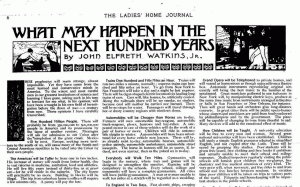The predicted extinction of the horse
 The other day I came across an article from the Ladies Home Journal, dated sometime in the year 1900. It was an article of predictions about what might happen in the next 100 years. An interesting read, some of the predictions were right on, like telephones being ubiquitous and color photographs being sent all around the world quickly. Others were WAY off, such as the ability to have stores send you things via pneumatic tube right into your home. But to me one of the more interesting predictions was that horses would become extinct. John Elfreth Watkins, Jr., the author of “What may happen in the next hundred years” expected that the invention of the automobile would eventually lead to everyone owning and using them for transportation. He was right about that. But he also guessed that the automobile would “have driven out the horse”. Furthermore, he said there would be “no mosquitoes nor flies” (if only). “The extermination of the horse and its stable will reduce the house-fly,” Watkins said.
The other day I came across an article from the Ladies Home Journal, dated sometime in the year 1900. It was an article of predictions about what might happen in the next 100 years. An interesting read, some of the predictions were right on, like telephones being ubiquitous and color photographs being sent all around the world quickly. Others were WAY off, such as the ability to have stores send you things via pneumatic tube right into your home. But to me one of the more interesting predictions was that horses would become extinct. John Elfreth Watkins, Jr., the author of “What may happen in the next hundred years” expected that the invention of the automobile would eventually lead to everyone owning and using them for transportation. He was right about that. But he also guessed that the automobile would “have driven out the horse”. Furthermore, he said there would be “no mosquitoes nor flies” (if only). “The extermination of the horse and its stable will reduce the house-fly,” Watkins said.
As much as I’d love to see the mosquito and house-fly disappear from the Earth, I’m glad horses weren’t “exterminated” or “driven out”, as he puts it. I suppose horses in 1900 were seen mostly as beasts of burden; probably the most common animal used for transportation and work at the time. If you had a horse, it was for work of some kind, compared with today when horses are mostly used for recreation in this country. People in 1900 also didn’t have the common comfort appliances we take for granted today, such as air conditioning. I can imagine people looking forward to horses being replaced with machines, if only to reduce the pestilence of flies that no doubt annoyed every homeowner when the weather was warm and the windows were open.
Anyway, I thought it was an interesting read for contemporary horse owners. My how things have changed!
There is some more text about horses in there, too. If you’d like to read the article yourself, click the title below. It’s about 450KB:
What May Happen in the Next Hundred Years Ladies Home Journal article (PDF)